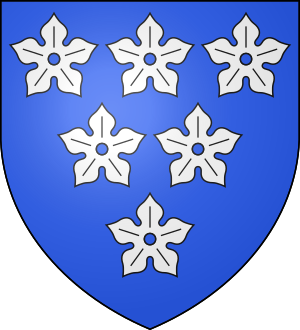Richard Fraser of Touchfraser facts for kids
Sir Richard Fraser was an important Scottish noble who lived a long time ago, during the late 1200s and early 1300s. He became the owner of lands called Touchfraser in Stirlingshire after his grandfather, Sir Gilbert Fraser, passed away around 1263.
Contents
Sir Richard's Early Life and Role
Sir Richard Fraser was the son of John Fraser of Touchfraser and Alicia de Conigburg. We first learn about him in 1276. At that time, he was a knight, which is a brave warrior who serves a king or lord. He was a witness when some land in East Lothian was given from one person to another.
In 1289, Sir Richard was sent to a special court hearing in Carham on Tweed. This meeting was ordered by King Edward I of England. The court was looking into a claim by a merchant who said that King Alexander III of Scotland owed him a lot of money when he died. Sir Richard went with his cousin, Sir Simon Fraser, and other important people.
Supporting John Balliol
After Queen Margaret, the "Maid of Norway," died in 1290, there was a time when Scotland didn't have a clear ruler. This period is called an interregnum. During this time, Sir Richard, like all the Frasers, supported John Balliol to become the new King of Scotland.
On July 8, 1291, Sir Richard promised his loyalty, known as fealty, to King Edward I of England. King Edward then chose him to be one of the people who would listen to the arguments from different people who wanted to be the Scottish king. In the end, John Balliol was chosen. The next year, Sir Richard was present twice when King Balliol showed his respect to King Edward.
Land and Responsibilities
Around the same time, on November 14, King Edward gave Sir Richard the wardship of lands in Peeblesshire. This meant Sir Richard would look after the lands of a young heir, Richard de Glen, who was too young to manage them himself. Sir Richard also got the maritagium, which was the right to decide who the young heir would marry. Sir Richard paid 100 merks for this special right. A merk was a type of coin used back then.
In 1293, King Balliol made Sir Richard the vicecomes or sheriff of Berwick. A sheriff was like a chief officer who kept law and order in a region.
Challenges and Loyalty Shifts
In 1296, King Balliol and King Edward had a disagreement. An English criminal, William Thorold, had run away to Scotland. When Sir Richard talked with the English sheriff about this, he pretended he couldn't make a decision. He said he hadn't been sheriff long enough to know what King Balliol wanted him to do. Because of this, King Edward took away Sir Richard's lands in Peeblesshire.
Sir Richard was reportedly captured when King Edward attacked Berwick Castle. However, his lands were given back to him on September 3 when he submitted to King Edward.
On August 28, 1296, in Berwick, Sir Richard again swore loyalty to King Edward I for his lands in Stirlingshire and Dumfriesshire. He was not among the Scottish nobles taken to England after the Battle of Dunbar. Instead, King Edward invited him to serve in a war against France in May 1297. Sir Richard also acted as a surety for his cousin, Sir Simon Fraser, who was a captive. This meant Sir Richard promised that Simon would behave.
It's not completely clear if Sir Richard went to France. On September 26, he was called to help Bryan Fitzallan against William Wallace, a famous Scottish leader. Later, in 1306, it seems Sir Richard fought for Robert the Bruce at the Battle of Methven. After this battle, some English soldiers tried to claim lands that were taken from Sir Richard.
The last time Sir Richard is mentioned in history is in 1307. He tried to get money back from King Edward I for looking after Richard de Glen. But King Edward refused, calling him a rebel. We don't know if Sir Richard ever married or when and where he passed away.
His personal seal showed a shield with six flower-like shapes, called cinquefoils, arranged in a pattern.
Sir Richard's Family
It is believed that Sir Richard had one son named Andrew Fraser, who passed away before 1297. Sir Richard's grandsons became very important figures:
- Sir Alexander Fraser (died 1332), who inherited Sir Richard's lands. His family line became the Frasers of Philorth, who are now known as the Lords Saltoun.
- Sir Simon Fraser (died 1333), whose family line became the Frasers of Lovat, Lords Lovat.
- Sir Andrew Fraser (died 1333).
- Sir James Fraser, the first of Frendraught (died 1333).
Sir Richard's Importance
In 1879, Alexander Fraser, who was the 18th Baron Saltoun, said that Sir Richard Fraser should have been given a much higher place in the family's history. He felt that even though we don't have many records about Sir Richard, what we do know shows he was a very important person.
 | Madam C. J. Walker |
 | Janet Emerson Bashen |
 | Annie Turnbo Malone |
 | Maggie L. Walker |


